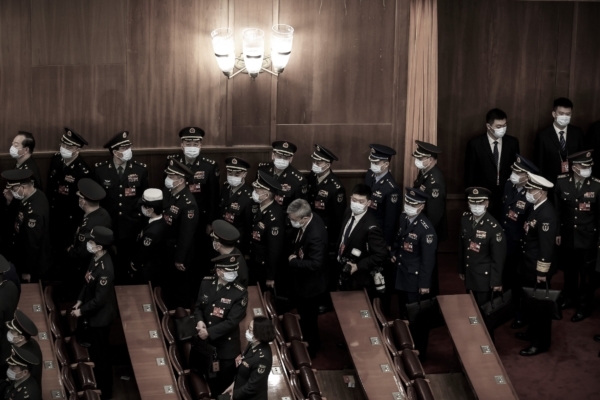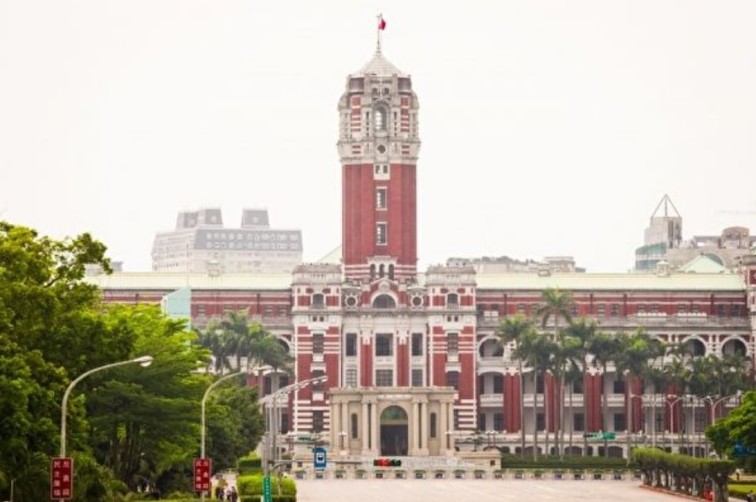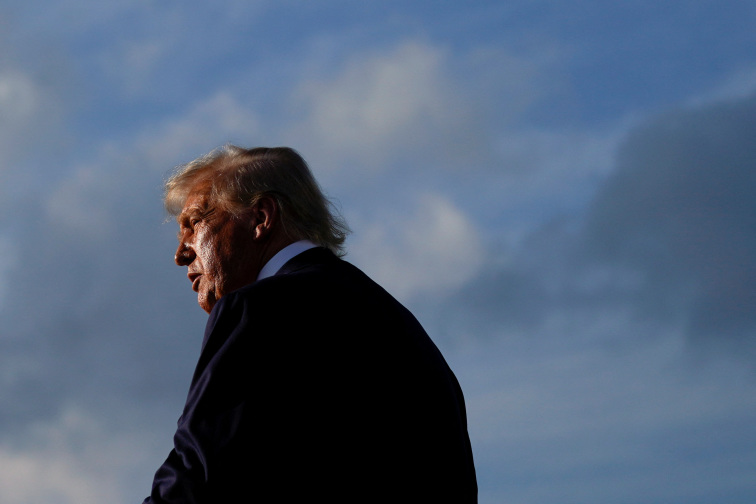File photo: On March 5, 2021, the day before the opening of China's National People's Congress (NPC), police patrol Tiananmen Square with dogs on a day of heavy air pollution in Beijing. (Photo by Kevin Frayer/Getty Images.)
[People News] Zong Qinghou, the founder of Wahaha Group, one of China’s leading food and beverage companies and a three-time Forbes-listed “richest man in China,” passed away in February 2024 due to illness. His daughter, Zong Fuli, subsequently assumed the role of chairwoman. However, she has recently become embroiled in an inheritance battle, as three individuals claiming to be her “half-siblings” have taken legal action against her. According to multiple media reports, this inheritance dispute has developed into a cross-border dual-track legal case in both Hong Kong and Chinese courts. The three plaintiffs — Zong Jichang, Zong Jieli, and Zong Jisheng — claim to be Zong Fuli’s half-brother and half-sisters.
1. Are They Really Siblings?
Public records show that Zong Fuli was born in January 1982 in Hangzhou, Zhejiang Province, and graduated from Pepperdine University in the United States. After completing her studies in 2004, she returned to China to join Wahaha and has long been considered Zong Qinghou’s only child. Following Zong Qinghou’s passing on February 25, 2024, Zong Fuli took over her father’s companies, including Hangzhou Wahaha Food Company and Zhejiang Wahaha Venture Capital Company.
The plaintiffs have submitted a 1989 birth certificate from Hangzhou for Zong Jichang and requested a DNA test using Zong Qinghou’s 2023 blood sample from a Zhejiang hospital. If the results confirm paternity, Article 1071 of China’s Civil Code — which grants equal inheritance rights to children born out of wedlock — would be a key weapon for the plaintiffs.
However, online rumours claim the three siblings are not “illegitimate children,” but that Zong Qinghou and their mother, Du Jianying, were legally married in the U.S. However, Zong Qinghou never formally divorced his original wife, Shi Youzhen, in China. This would mean Zong had two wives, constituting bigamy.
A former Wahaha employee said Du Jianying was one of the first college graduates hired by Wahaha and contributed significantly to the company’s development. She was considered the undisputed “No. 2 figure” in the firm, highly respected and well-liked.
Data from Tianyancha (a business information platform) shows that as early as 2022, the names of plaintiffs Zong Jichang and Zong Jieli appeared as board members of Wahaha-related companies. From June to July 2024, Zong Jichang served on the boards of four Wahaha-affiliated companies in Nanjing, Tianjin, Dali, and Shuangcheng. Zong Jisheng currently holds no positions in Wahaha.
2. How Much Are They Asking For?
The plaintiffs claim that during his lifetime, Zong Qinghou promised them trust fund benefits totalling USD 2.1 billion and instructed subordinates to set up the trust at HSBC in Hong Kong. A lawsuit has already been filed in a court in Hangzhou.
They’ve also sued in Hong Kong’s High Court, seeking to freeze USD 1.8 billion in an HSBC account under Zong Fuli’s name. They are demanding that she execute their father’s will, pay them millions in accrued interest, and compensate them for losses due to asset transfers. Additionally, they are asking for a split of Wahaha Group’s 29.4% stake, worth over RMB 20 billion based on the current valuation.
3. Root Cause: No Will, No Designated Successor
Zong Fuli argues that the disputed trust funds were Wahaha’s overseas development reserves. She claims the USD 1.1 million transfer was to pay for equipment at a factory in Vietnam, providing contracts and invoices as proof.
However, the plaintiffs’ lawyer argues that in his final years, Zong Qinghou privately acknowledged the “Zong bloodline” of these three children and verbally promised “not to treat them unfairly.” The witnesses to the supposed will were all Wahaha executives, with no family members signing or witnessing, raising procedural issues.
Zong Fuli’s legal team has rejected the validity of the evidence, stating Zong Qinghou never issued such instructions to her.
On July 13, reporters from Southern Metropolis Daily contacted Wahaha for comment. The company responded: “This is a private family matter and has no relation to company operations. We will not provide any official comment.”
Zong Qinghou failed to leave a clear will or designate a successor, and now his children are locked in a fierce fight over his assets.
Back in July, a resignation letter allegedly signed by Zong Fuli circulated online. It stated she was stepping down as vice chair and general manager due to shareholder doubts over her management. Yet only a month later, the plot flipped — Zong Fuli officially took over as legal representative, chairwoman, and general manager of Wahaha, assuming control of her father’s 29.4% stake.
Zong Qinghou’s younger brother, Zong Zehou, posted on social media: “Zong Fuli’s biggest problem is that in taking over Wahaha, her focus should not be on expansion, profit, or aggressive reform. She should start with doing good deeds and charity, earning people’s recognition. In this process, she could uncover problems and identify talent, naturally gaining support for her leadership. Instead, she did the opposite — aggressive and high-profile. As the saying goes: the rigid breaks easily.”
Yet after “returning,” Zong Fuli did not heed her uncle’s advice. Instead, she launched sweeping reforms under a strategy dubbed “De-Wahaha-ization.” She demanded that a large number of Wahaha employees transfer their contracts to “Hongsheng” — a new company she personally established.
By July 2025, many Wahaha subsidiaries under Zong Fuli had been renamed under “Hongsheng,” including Guiyang Wahaha Changsheng Beverage Co. and Chengdu Wahaha Changsheng Beverage Co. Meanwhile, multiple new sales companies were set up under Hongsheng to gradually reduce dependence on Wahaha’s traditional sales channels.
It was precisely these aggressive reforms that alerted the plaintiffs, triggering the current inheritance battle.
4. “The Mantis Hunts the Cicada, Unaware of the Oriole Behind”
Wahaha is essentially a knock-off of Taiwan’s Want Want brand. That it operated for years under China’s authoritarian system without scrutiny suggests deeper political connections.
According to official business records, Wahaha’s ownership structure is:
Government-owned shares: ~46%, held by Hangzhou Shangcheng District Investment Holding Group Co., Zong family stake: 29.4%. Employee shares: 24.6%
Wahaha is thus a “mixed ownership” enterprise — government stake + private control + employee shareholding — a typical model in the CCP’s economic system.
If the Zong family privately transfers or divides company assets without legal procedures, it could trigger serious consequences. The Chinese Communist Party (CCP) could fabricate numerous charges.
Zong Fuli might consider confiding in Dong Mingzhu, former star executive at Gree Electric, who was recently reported to be under serious investigation by the State-owned Assets Supervision and Administration Commission (SASAC), involving control rights, leadership changes, and stock restructuring.
She might also look to the Fuling Zhacai (pickled mustard) family scandal of 2020 — one of the CCP’s most notorious family-business controversies. Multiple family executives were investigated, triggering stock crashes, plummeting valuations, and public distrust.
Or she might consider the case of Anbang Insurance. In 2017–2018, founder Wu Xiaohui transferred massive funds to personal and overseas accounts. He was sentenced to life imprisonment by the CCP for illegal fundraising and embezzlement. Anbang was then taken over by China’s central bank, with its assets forcibly restructured.
So why has the Wahaha inheritance storm attracted so much attention? Very likely, it has caught the eye of the CCP.
Many private entrepreneurs may think they hold high social status, but in reality, they’ve become fat sheep awaiting slaughter by the regime. Only by swiftly distancing themselves from the CCP and escaping its grip can they hope for a slim chance at survival.










News magazine bootstrap themes!
I like this themes, fast loading and look profesional
Thank you Carlos!
You're welcome!
Please support me with give positive rating!
Yes Sure!